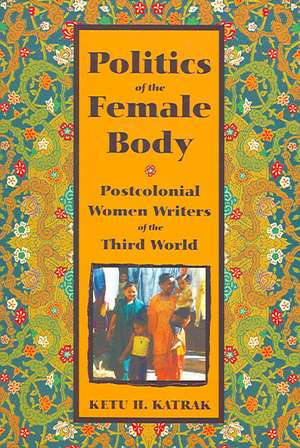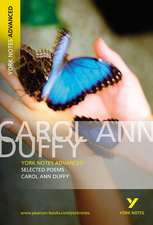The Politics of the Female Body: Postcolonial Women Writers
Autor Professor Ketu Katraken Limba Engleză Paperback – 15 feb 2006
Is it possible to simultaneously belong to and be exiled from a community? In Politics of the Female Body, Ketu H. Katrak argues that it is not only possible, but common, especially for women who have been subjects of colonial empires.
Through her careful analysis of postcolonial literary texts, Katrak uncovers the ways that the female body becomes a site of both oppression and resistance. She examines writers working in the English language, including Anita Desai from India, Ama Ata Aidoo from Ghana, and Merle Hodge from Trinidad, among others. The writers share colonial histories, a sense of solidarity, and resistance strategies in the on-going struggles of decolonization that center on the body.
Bringing together a rich selection of primary texts, Katrak examines published novels, poems, stories, and essays, as well as activist materials, oral histories, and pamphlets—forms that push against the boundaries of what is considered strictly literary. In these varied materials, she reveals common political and feminist alliances across geographic boundaries.
A unique comparative look at women’s literary work and its relationship to the body in third world societies, this text will be of interest to literary scholars and to those working in the fields of postcolonial studies and women’s studies.
Through her careful analysis of postcolonial literary texts, Katrak uncovers the ways that the female body becomes a site of both oppression and resistance. She examines writers working in the English language, including Anita Desai from India, Ama Ata Aidoo from Ghana, and Merle Hodge from Trinidad, among others. The writers share colonial histories, a sense of solidarity, and resistance strategies in the on-going struggles of decolonization that center on the body.
Bringing together a rich selection of primary texts, Katrak examines published novels, poems, stories, and essays, as well as activist materials, oral histories, and pamphlets—forms that push against the boundaries of what is considered strictly literary. In these varied materials, she reveals common political and feminist alliances across geographic boundaries.
A unique comparative look at women’s literary work and its relationship to the body in third world societies, this text will be of interest to literary scholars and to those working in the fields of postcolonial studies and women’s studies.
Preț: 317.35 lei
Nou
Puncte Express: 476
Preț estimativ în valută:
60.73€ • 64.94$ • 50.63£
60.73€ • 64.94$ • 50.63£
Carte tipărită la comandă
Livrare economică 17 aprilie-01 mai
Preluare comenzi: 021 569.72.76
Specificații
ISBN-13: 9780813537153
ISBN-10: 0813537150
Pagini: 328
Dimensiuni: 152 x 229 x 38 mm
Greutate: 0.43 kg
Ediția:None
Editura: Rutgers University Press
Colecția Rutgers University Press
ISBN-10: 0813537150
Pagini: 328
Dimensiuni: 152 x 229 x 38 mm
Greutate: 0.43 kg
Ediția:None
Editura: Rutgers University Press
Colecția Rutgers University Press
Notă biografică
Ketu H. Katrak is a professor in the department of Asian American studies (Chair, 1996-2004), and the departments of English and Comparative Literature at the University of California, Irvine. She is the author of Wole Soyinka and Modern Tragedy: A Study of Dramatic Theory and Practice and coeditor of Antifeminist Harassment in the Academy.
Cuprins
Preface
Acknowledgments
1. Theorizing a Politics of the Female Body: Language and Resistance
2. Indigenous Third World Female Traditions of Resistance: A Recuperation of Herstories
3. English Education Socializing the Female Body: Cultural Alienations within the Parameters of Race, Class, and Color
4. Cultural "Traditions" Exiling the Female Body
5. Motherhood Demystified
Conclusion
Notes
Index
Acknowledgments
1. Theorizing a Politics of the Female Body: Language and Resistance
2. Indigenous Third World Female Traditions of Resistance: A Recuperation of Herstories
3. English Education Socializing the Female Body: Cultural Alienations within the Parameters of Race, Class, and Color
4. Cultural "Traditions" Exiling the Female Body
5. Motherhood Demystified
Conclusion
Notes
Index
Recenzii
Arguing that the postcolonial female body itself is constituted as a figure of exile and self-alienation, Katrak projects a transnational feminist solidarity against states of domination or exception, a solidarity that articulates feminist postcolonial theory with anticapitalist and democratic activism.
Descriere
Is it possible to simultaneously belong to and be exiled from a community? In Politics of the Female Body, Ketu H. Katrak argues that it is not only possible, but common, especially for women who have been subjects of colonial empires.

















